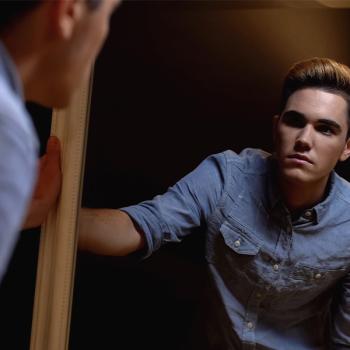Elijah went to meet with God. You would think there might be this 3-D screen that would pop-out of the sky and God would appear to Elijah in the smoke and music of a rock concert, and all of those came believe me, but God wasn’t in any of them.
He was in the silence. In the quiet.
In the place where all things break down, God was there. Silence is the nothingness of noise. God, in this moment equated himself with the nothingness of noise to get across to Elijah that in the nothingness, in the most deconstituted place of his existence, She was there with him.
I think Elijah has a lot to tell us about prayer.
To help us better understand what has happened to prayer, I think we have to listen in to a psychoanalyst by the name of Jacques Lacan. When a child is in its predominant learning stage it looks to the mother as the sole nurturer of its reality. The role of the mother cannot be underscored here. The child believes that the mother is pulled away by outside desires, because this is an unknown element, psychoanalyst Jacques Lacan refers to this imaginary object as the Phallus. Which itself is an imaginary object.
It represents the unknown element.
During the early years the child will attempt to make itself the Phallus to attempt to become the very imagined desire that the mother is seeking. When in a moment of epiphany, the child begins to realize that they cannot fulfil the imagined desire the child then enters into castration. Which is the realization that it is powerless to fulfil this unknown desire.
When we come to pray, there is a tendency to assume that it is about us off-loading the stresses of our days, or verbalizing our Amazon Wish Lists to God or maybe even praying for world peace. In this instance we are attempting to deform prayer into something that is still about us. Think about this way: “God, I would love it if you could do something about the homeless lady down the street” or “Can you help me get into Harvard?” If you notice the first prayer, however altruistic, it still starts out with the concept of I, and ends with others.
It’s in this heartfelt prayer that we find traces of egotistical altruism.
It isn’t that the prayer itself is wrong, it’s that the underlying request lies in a spirit how it relates to us. So, in this example the prayer is indirectly about the other and directly about ourselves. We are projecting something than that isn’t true about ourselves.
I think if we also flip Lacan’s Phallus back on to prayer, we then also realize that we have imposed upon prayer something that it’s not. In that regard we are imposing our dreams, wishes and hopes on to something that is imaginary. We then anticipate that this imaginary object of our creation will materialize all of the things we are praying for. In this instance, prayer is not only perverted, but then, becomes something that itself encourages our imaginary presuppositions of prayer.
Prayer than plays into our deepest desires.
In that instance, prayer stops being prayer and is now a fetish. Where we focus all of our attention onto our imaginary understandings of prayer and begin to forget what prayer stands for. When we turn prayer into a fetish (focus on prayer itself rather than what it represents) we murder the symbolism that prayer represents. In that moment prayer becomes an idol we worship rather than discovering what is beyond the idol. We strip prayer of any real jouissance, (aka) orgasmic appeal or bliss, that comes out of not getting what you want, but rather what you need.
That’s why I think its important that Elijah didn’t discover God in the elements. Which is how the ancient world operated in their understanding of how God responded to their requests. It was in the nothingness that God responded or chose not to respond, depending on how you personally define it. The word for silence in that narrative is better explained as God’s voice was the silence itself. Elijah’s jouissance wasnt discovered in the flashes of light, but in the darkest moment of his life. His own dark night of the soul.
When he least expected it, he began to realize that even when there is nothing left to live for, God is that nothing left to live for.
And it’s not found in the responses to our prayers.
Its found in the non-responses to our prayers. In fact, God doesn’t answer at all in the typical rhetoric of how we have come to define prayers. God doesn’t answer. She doesn’t answer our prayers. Job learned this. Jesus learned this at his most tragic hour. But, this isn’t a bad thing. The idea that God interacts with every request isn’t present in the narrative arc of scripture, we see just the opposite, why? Because rather than God interacting with our prayers, she desires to interact with us. I think prayer isn’t whether we are spending 15 minutes with God, or how many times a day, or if we’re praying for lofty ideals, but rather its the realization that when we connect with another human and when we connect with the divine, we are praying. That is prayer.
The Jewish-Christian-Islamic patriarch Abraham was talking to one of his family members and he uses the word pray, in fact, a large portion of the Genesis narrative is peppered with this word usage: “And Abram said unto Lot, Let there be no strife, I pray thee, between me and thee, and between my herdsmen and thy herdsmen; for we [be] brethren.” (Genesis 3:18, KJV) Notice how prayer is used here. Not as a way to get something from God or as a Christmas stocking filled with all kinds of goodies, it’s used to encourage peace amongst one another. It’s a word that speaks of humanitarian cohesion. Not strife. Not violent disagreement.
But towards peace. It endorses familial connection. Familial repair.
To see that we are connected to one another.
In other places in Genesis it also used in the same way but as God being the one who is spoken to. Prayer is connecting to the person next to us, not for fixing a flat tire. Prayer is connection with the divine. Don’t get me wrong, I don’t think that those things don’t happen, I have personally experience the ecstatic nature of prayer, but there is more to it than the vending machine approach we see all too prevalent today. Prayer is the discovery and space where we encounter one another for the first time again and again. Where we encounter the Divine again and again and again. In that case, I hope we pray a whole lot more!
Read more responses on prayer this week as part of our new What Do I Really Believe? series at Patheos.













